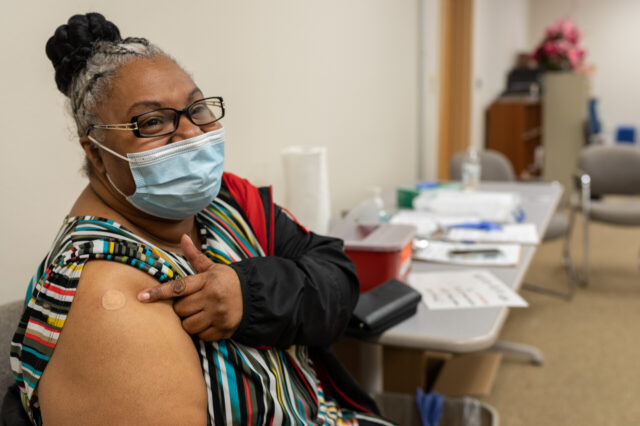UF Health researcher answers questions about the Johnson & Johnson COVID-19 vaccine

And now, there are three.
Johnson & Johnson recently received emergency use authorization for its single-shot COVID-19 vaccine from the U.S. Food and Drug Administration. That step makes it the third vaccine to be approved in the battle against the novel coronavirus pandemic, joining vaccines made by Moderna and Pfizer with its German partner BioNTech.
Millions of Americans have been vaccinated since the Pfizer vaccine was authorized in December, and President Joe Biden has said enough vaccine supply will be available by the end of May for any adult who wants to be vaccinated. The administration has also brokered a deal in which Merck & Co. will help manufacture the Johnson & Johnson vaccine, which is expected to greatly expand the supply of vaccines in the coming weeks.
Cindy A. Prins, Ph.D., M.P.H., a University of Florida Health infectious disease epidemiologist who is an associate professor in the UF College of Public Health and Health Professions and the UF College of Medicine, explains key points about this newest player on the COVID-19 vaccination front.
Question: Why is it important to have another vaccine available?
Answer: Relying simply on one vaccine means that you’ve only got one manufacturer providing a lot of doses, not only in our country but around the world. It’s really helpful to have multiple manufacturers, multiple vaccines and also multiple types of vaccines to have the capacity to produce enough vaccine to get everyone immunized as quickly as possible.
Q: Which vaccine should people get?
A: The best vaccine is the one that you can get in your arm now. I wouldn’t hold out for one vaccine versus another. I know that some people are looking to do that. But what’s critical right now is to get immunized. In the time that people may wait thinking they might have a preference, they could potentially get infected with COVID-19. These are all really good vaccines and there’s value in getting any one of them.
Q: How effective is the Johnson & Johnson vaccine?
A: Johnson & Johnson conducted its vaccine trials in several different countries, reporting efficacy within the United States, Latin America and South Africa. So the numbers vary. When you look at all three areas overall, the vaccine was 85% efficacious in preventing severe COVID-19, with no reports of hospitalization or death 28 days after vaccination.
Q: Does the Johnson & Johnson vaccine have advantages over Moderna’s or Pfizer’s?
A: Yes. The primary benefit is that it’s a single-dose vaccine, while the Moderna and Pfizer vaccines require two shots several weeks apart. Any time you need to bring someone back for a second dose, that can create complications of getting folks scheduled, getting them there. It is nice to have a single-dose vaccine. One and done.
Another thing that’s nice about the Johnson & Johnson vaccine is that it’s actually a more stable vaccine. And so it can be stored in a refrigerator for up to three months. There’s not quite that panic of having to get every single dose out of that vial within six hours like there is with other vaccines.
Q: How does the Johnson & Johnson vaccine work?
A: This vaccine uses an inactive version of a common cold virus called adenovirus. This virus is something that all of us encounter as a seasonal cold. The adenovirus delivers a harmless piece of the coronavirus DNA to your cells to help trigger your body’s immune system to recognize the coronavirus spike proteins as foreign. Your immune system learns to create antibodies to destroy these spike proteins, which can protect you should you become infected with COVID-19 later.
Q: Can you get the coronavirus from the Johnson & Johnson vaccine?
A: Absolutely not. It uses a small piece of the coronavirus, not the live virus itself. In fact, you can’t even get the common cold from the vaccine, which as we’ve said, uses the adenovirus to gain entry to your cells. It’s important to remember that you cannot get the coronavirus through a vaccination from the Moderna or Pfizer vaccines, either. All these vaccines are safe. And your body will flush out the tiny bits of virus genetic material but will still leave your immune system ready to fight future infection.
Q: Are the side effects to the Johnson & Johnson vaccine similar to what you might experience for any vaccine, including Moderna’s and Pfizer’s?
A: Yes. Johnson & Johnson saw some minor fever. They saw headaches and body aches and fatigue, which were not major. And with this vaccine it’s only one dose. So, you don’t have the possibility of dealing with side effects for two different doses. If you get side effects, it’s because your immune system is doing its job by reacting to something foreign.
Media contact: Ken Garcia at kdgarcia@ufl.edu or 352-273-9799.
About the author
